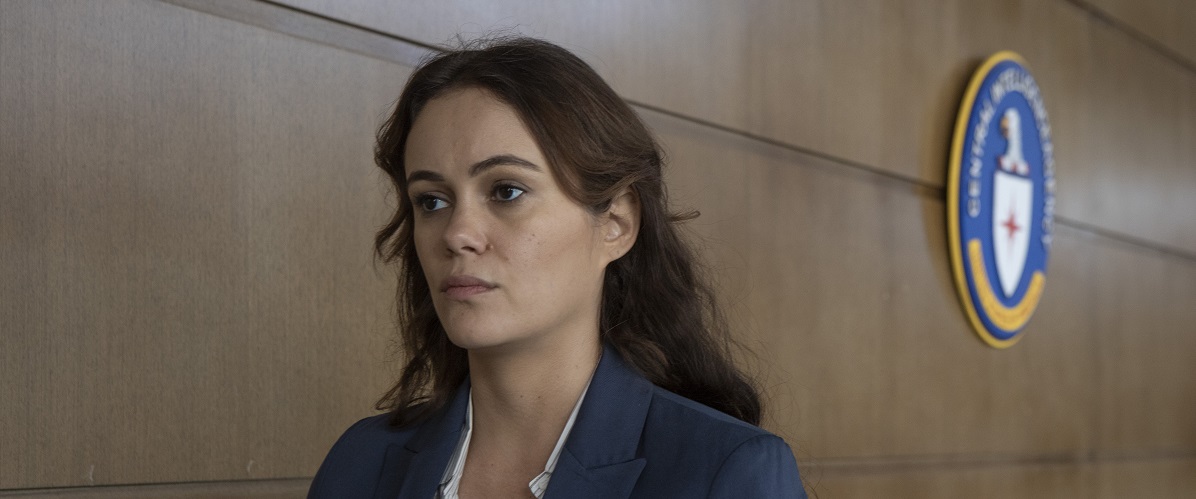Before Osama bin Laden carved out a particularly venomous space in the popular Western imagination as the boogeyman for Islamic terror, Imad Mughniyeh practically wrote the playbook. In the 1980s, the secretive Hezbollah leader founded Lebanon’s Islamic Jihad Organization, himself a “ghost” thought to be responsible for a string of anti-American bombings and kidnappings throughout the region. It was only in 2008 that a car bombing (allegedly coordinated between the CIA and Mossad) ended his life. Showtime’s new miniseries, “Ghosts of Beirut,” offers up a “Zero Dark Thirty”-esque search for Mughniyeh, spanning multiple decades and perspectives. But in juggling all of these points of view, it conveniently forgets to make any of them particularly interesting, resulting in a stilted spy drama that refuses to elevate itself above mere procedure.
Created by Avi Issacharoff and Lior Raz, “Ghosts of Beirut” begins every episode with the same disclaimer: “This is a fictional account of deeply researched events.” This research, curiously, is borne out in talking head interviews that punctuate the prestige-drama action, with former CIA operatives, journalists, and Mossad spymasters stressing the significance of Mughniyeh’s reign of terror. He’s described as an “absolute Machiavellian mastermind.” The show’s titles introduce him belaboredly as “Imad Mughniyeh, AKA Radwan, AKA The Ghost. Mossad Target. CIA Obsession.” This is a bad, bad dude, and the show purports to meticulously track the heroic efforts of the CIA and Mossad to take him down.
Like Issacharoff and Raz’s previous series, Netflix’s Israeli military thriller “Fauda,” you can see the attempts at evenhandedness here. We spend as much time with Mughniyeh, both as an idealistic twentysomething (Amir Khoury) and guarded middle-aged man (Hisham Suleiman), and his wants/needs as we do the dozen CIA and Mossad officials either trying to survive him or hunt him down. He’s driven, passionate, and a born leader; much of the first episode is dedicated to watching him convince his first suicide bomber to do the deed. “You push the button and go to paradise,” he purrs to his friend, already driven to anger by his family’s death at the hands of Israeli bombs.
But as much as the show strives to humanize Mughniyeh and understand his motivations, it struggles to keep up that momentum on the other side of the equation. Perhaps that’s because of the sheer number of people tasked with finding him over the years; there are three sets of protagonists over four episodes, none of them getting much screentime to lend their characters anything but the broadest strokes. Whether it’s Dermot Mulroney’s gregarious Robert Ames, working deals to try to find a two-state solution, Garret Dillahunt’s dogged and doomed CIA fixer William Buckley, or Dina Shihabi’s ultimately successful operative Lena, there’s little meat on their bones besides “let’s find this guy.” Suggestions of deeper motivations, like Lena’s desire to prove herself despite being herself a Lebanese Shia with a cousin in Hezbollah, never go beyond that.
Director Greg Barker, a filmmaker known for documentaries like “Sergio” and “Ghosts of Rwanda,” seems too bogged down in procedure to make the interpersonal drama sing with any particular key. There’s simply no time to treat Lena’s inner conflict, or her budding dynamic with Mossad operative Teddy (Iddo Goldberg, doing the most with limited material), with much gravity; even older Mughniyeh’s brushes with new romance feel like rote attempts to humanize him. They feel like brief, rote gestures towards the humanity in everyone, even as Barker fills the remaining time with real-life figures stressing the monstrous nature of Mughniyeh’s acts. (Even those segments get downright intrusive; they don’t add much beyond a vague air of authority and stop any sense of dramatic momentum dead in its tracks.)
More than anything, “Ghosts of Beirut” wants to have its sociopolitical cake and eat it too; it shrugs in the direction of sympathy for the motivations and mindsets of people like Mughniyeh but never digs too deeply into the broader foreign policy atmosphere that led these people to this crucial point. It feels downright morbid to imagine this rich, full life for Mughniyeh, with a wife and children and his own share of inner conflict about the people he’s sending to their doom—only to have real-life CIA operatives turn around and stress just how bad of a guy he is. There’s a way to do it right, but a gleeful takedown of a terrorist mastermind probably doesn’t need this much preamble on either side of the firing line.
The spycraft is impressive and all, and there’s plenty in “Ghosts of Beirut” for folks who love watching dudes wind red yarn around maps or stare at banks of screens showing security camera footage. But it all feels like such a foregone conclusion, four hours spent waiting for a bomb to go off, with little of import said about the complexities of the Middle East conflict. Sure, Mughniyeh is a monster; but what role did our heroes play in making him in the first place? It’s a question “Ghosts of Beirut” simply doesn’t have time to answer.
Whole series was screened for review. “Ghosts of Beirut” premieres May 19th on Showtime streaming, then makes its broadcast debut May 21st.




















